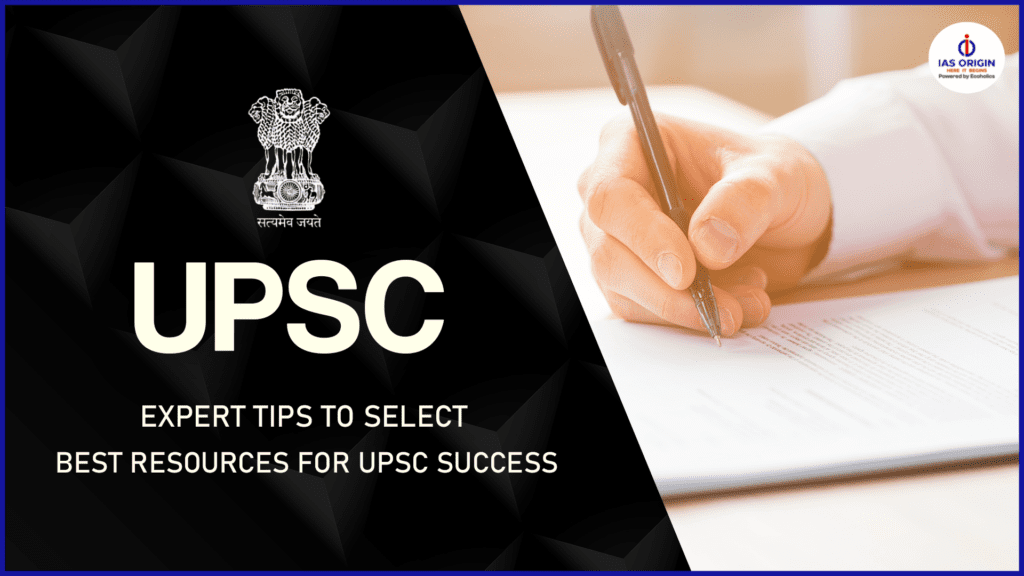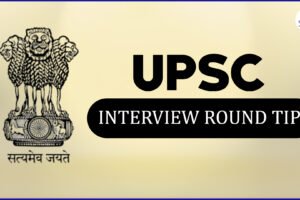
Expert Tips to Select Best Resources for UPSC Success Part I
- Selecting the best resources for UPSC preparation can be a make-or-break decision.
- In the vast ocean of UPSC study materials, aspirants can easily get lost if they choose wrong.
Cracking UPSC CSE is a dream for lakhs of aspirants, and selecting the best resources for preparation can be a make-or-break decision, here’s part I. Interestingly, the selection ratio is around 0.01%, and the failure of over 99% of aspirants can be attributed to either a flawed preparation strategy or a wrong selection of resources.

The Union Public Service Commission Civil Service Examination has a vast syllabus covering diverse topics. An efficient preparation strategy requires strategic selection of resources, as wasting time on irrelevant and unreadable materials will not bring results. Also, the UPSC examination goes beyond memorising the facts; it requires an approach that fuels analysis, interpretation, and application of attained knowledge.
Selecting the best resources for UPSC success revolves around understanding the syllabus and examination pattern. It also includes identifying learning styles, seeking recommendations and reviews from experts, starting with free resources, choosing quality over quantity, and being strategic while considering paid options. There are some other aspects which will be discussed further.
Before Selecting the Resources, Understand the Syllabus and Exam Pattern
Aspirants should consider understanding the UPSC CSE syllabus and examination pattern before selecting optimal resources for preparation because it provides deep insights into the examination requirements and helps them identify high-yield areas.

Take a Deep Dive in the UPSC Pool
Taking a deep dive into the UPSC information pool is beneficial as it provides clarity of scope, helps build a strong foundation, facilitates strategic navigation through underlying hurdles, and develops comprehensive analytical skills. When an aspirant knows the exact topics that will be covered, it dramatically helps focus the energy and avoid irrelevant studying habits.
Consider the UPSC CSE syllabus as your roadmap for success. It can help you plan your preparation strategically while prioritising core concepts if understood correctly. It would be highly beneficial if an aspirant could understand the intricacies and interconnections between different sections.
When aspirants know the mark distribution and weightage allocated to each section, they can strategically plan the preparation journey. This also allows aspirants to focus more on high-yield areas, facilitating focused learning while acknowledging the importance of covering the entire syllabus.
Every aspirant should know the examination pattern in greater detail. There are three stages, Prelims, Mains and Final interview. If an aspirant has detailed knowledge of the number of questions, types of questions, marking schemes, and related aspects, they can prepare accordingly.
How can focusing on high-weight areas bring desired results?
With an in-depth understanding of the syllabus and exam pattern, aspirants can highlight the high-yield topics. For maximum returns or optimal success, they can identify sections carrying higher weightage for both preliminary and main examinations. Various issues of Indian Polity, Current Affairs, Economy, or Science & Technology have different weights, and focusing on high-yield topics can bring better results.
When an aspirant invests more time and resources in mastering high-scoring areas, it could boost the chances of success. Also, if aspirants analyse the previous year’s question papers, they develop an understanding of the underlying concepts. Staying updated on syllabus and exam pattern changes can help you adapt your preparation strategically.
Taking a deep dive into the syllabus and examination pattern and focusing on high-yield topics are believed to increase the chances of success. Furthermore, it facilitates interlinking connections and develops a sense of critical thinking. Regular practice through mock tests and seeking guidance from experts can also help significantly.
Related Read: Smart Hacks to Clear UPSC CSE in First Attempt: For Beginners
Identify Your Learning Style Before Selecting UPSC Resources
Before indulging in UPSC preparation, it’s crucial first to identify your learning style. Knowing how better you understand the material allows you to tailor your study methods to boost your chances of success. The UPSC syllabus is vast; understanding each point, retaining crucial information, and developing an ability to recall information during exams could help you crack UPSC CSE on your next attempt.

Before diving deep and collecting resources for UPSC preparation, it is essential first to identify your learning style. Aspirants must know if they are visual, auditory, or kinesthetic learners. Each learning style has pros and cons; hence, it’s better to understand the intricacies before selecting one.
Visual Learners
As the name suggests, visual learners excel at processing information presented visually like diagrams, flowcharts, mind maps, videos, etc. These types of learners have the ability to effectively memorise facts, figures, and timelines of crucial events if they are represented visually.
Such aspirants should highlight important information and pointers in study materials using colour coding for better retention. They can also use flowcharts and mind maps to represent complex processes and pointers in history, polity, and economy to understand these points at a glance better.
Visual learner aspirants are better at deciphering visually represented information. Multiple events or topics in history, politics, current affairs, etc., can be easily understood if aspirants have a proper timeline of dynasties; they can utilise diagrams and charts for other related topics.
Auditory Learners
Auditory learners are better at learning through listening to lectures, discussions and audiobooks. Plus, they are better at retaining information if they recite the facts, figures and concepts out loud. Study groups, meetings, online forums, debates, etc., can significantly help auditory learners.
Nowadays, auditory learners have multiple options, from podcasts to video lectures; they can also listen to expert lectures on various topics. They gain valuable insights while discussing study materials with peers, experts, or mentors. Auditory learners can record and listen to their summaries while revising the topics.
Kinesthetic Learners
Kinesthetic learners understand the topics better if they actively engage in hands-on activities, role-playing, and doing things themselves. They remember the concepts better by enacting them or using physical aids such as flashcards. Also, such aspirants retain information better if they actively practice answer writing and solve mock tests.
Extensive writing practice for answers and essays makes it easier for aspirants to retain information. They can develop and sharpen their note-making ability using flashcards for memorising vital facts, definitions, and dates. Being actively involved in understanding UPSC preparation boosts the chances of selection.
Do not Shy away from Seeking Recommendations & Reviews
UPSC aspirants must always seek recommendations and reviews from experts, mentors, etc. while navigating vast landscapes. Preparing without guidance would be like being a captain of a ship that’s on a voyage without any map or compass.

Moreover, these recommendations and reviews provide valuable insights for efficient and effective studying. However, aspirants are advised to filter these recommendations before incorporating them into their preparation strategy. They can talk to toppers, veterans, mentors, and experts, plus they can read online reviews to boost their chances of success.
Talk to Toppers, Veterans, Mentors & Experts UPSC
While talking to toppers, veterans, mentors, and experts, aspirants gain firsthand knowledge about their preparation strategies, resource recommendations, and examination insights. Their motivating success stories can fuel your drive and commitment to become a successful civil servant.
This scenario also provides tailored advice to identify your strengths, weaknesses, and learning styles. Also, seeking help addresses the roadblocks in overcoming specific challenges. But access to toppers and experts might only be possible for some.
Only some pieces of advice would resonate with your preparation strategy and preferences. Plus, some mentors and coaching services could come with significant financial commitments. Aspirants should also remember that although talking to toppers, veterans, mentors, and experts provides you with guidelines and insights, incorporating them in preparation must be your decision.
How Important is Reading Online Reviews?
Nowadays, every aspect of the UPSC syllabus, reading material, podcasts, etc., is available online. Aspirants must be vigilant in selecting the best online resources, and reading online reviews can play a crucial role in making the right decisions. Online reviews can provide comparative analysis when comparing two or more resources on the same topic.
Reading online reviews also provides the ability to identify trends, and aspirants get a sense of what is generally considered effective or ineffective in UPSC preparation. It should be noted that not all online reviews are genuine or objective, and you must steer away from biased or promotional content.
Sometimes, reviews need to reflect the latest examination pattern changes or syllabus changes. Also, going through multiple online reviews could be a time-consuming endeavor. Nonetheless, reading online reviews provides insights into the credibility of online resources, and they should be incorporated with a pinch of salt.
Selecting proper resources for UPSC preparation is, without a doubt, a make-or-break decision. With the availability of multiple options, aspirants need clarification. But if an aspirant understands the syllabus and exam pattern, has an idea about your learning style, and does not shy away from seeking guidance, they can select the best study material for UPSC preparation.
At IAS Origin, experts can help you select the best resources and provide hard copy GS study material delivered to your doorstep. Book a call with our mentor to strengthen your chances of becoming a successful civil servant.



